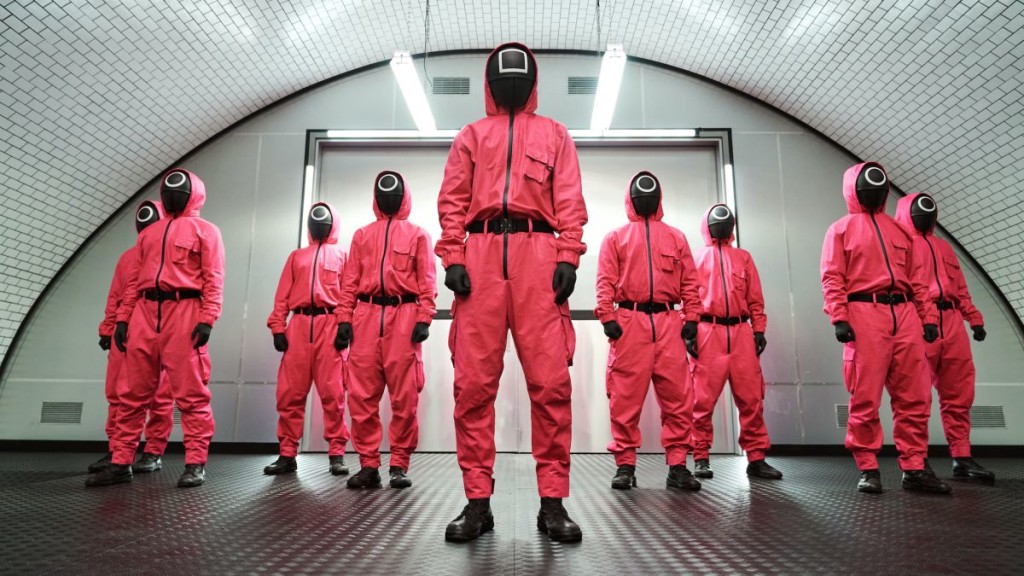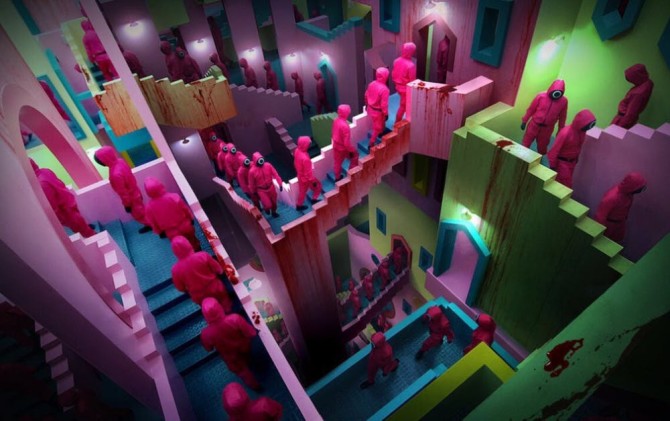The story behind Squid Game is almost as compelling as the story in it.
Squid Game is a sensation.
Ted Sarandos, Netflix’s content guy, says that the show is on track to become the most watched piece of entertainment in Netflix’s history.
Full disclosure, I watched the first episode and a half of Squid Game and I didn’t think it was very good. Korean cinema can be kind of goofy, in my opinion, which can sometimes take me out of the story.
There was an early scene, for example, where a business man plays a weird game with our protagonist where he drops an envelope on the floor and if it doesn’t land just right, the other guy gets to hit him. The protagonist proceeds to lose 60 times in a row and the other guy just keeps hitting him afterwards. Quite frankly, I thought it was one of the dumbest scenes I’d ever seen. It yanked me right out of the show and I couldn’t get back into it.
There were some other issues I had as well. Why do the people get to vote to stop the game? That’s lame. It’s so much better if they’re forced to play it. I gave up watching after the people were allowed to quit.
BUT. That does not change the fact that Squid Game is a runaway success. I’ve seen several of you praising it in the comments. And the internet loves it (I recently read that the squid game hash tag has been shared 22 billion times on TikTok, which I guess means everyone in the world has used the hashtag 3 times each). I texted my brother (who has zero interest in Hollywood) to see what he thought and he said, “I haven’t seen it but the world is screaming at me to watch this, so I will.” And that’s the current pull of the show. Everybody knows about it. Everybody is going to check it out if they haven’t already.
But, as was brought to the world’s attention this week, the creator, Hwang Dong-Hyuk, has been pitching the show to Hollywood for ten years and they all told him it wouldn’t work. He was so broke at one point, he had to sell the very laptop he was writing the script on!
So what happened here? Writers love a good “the studios were wrong!” story. But were they wrong? Was this a guaranteed hit that the studios missed?
Let’s dig into that question.
One of the things I’ve found is that if you’re an unknown writer and you have a really unique vision – your story is going to look different than anything else out there – it’s hard to convey that on the page. I remember when Zach Braff was trying to get Garden State made and nobody gave him the time of day because the script was so bad. However, after he made a strong visually unique film, everybody was surprised as to how Garden State could’ve been rejected. Well, it was rejected because there was no way to show everyone what the movie would look like using just words.
Which is clearly what’s happened here. Squid Game is all about the look. The dudes with the weird masks and these ridiculous colorful game sets – the second you see that on Netflix’s home page, you’re intrigued. And if you’re intrigued, you’re going to check it out.
But let’s not pretend like it an obvious hit and everyone who passed on it was dumb. There wasn’t any way to know the show was going to look the way it does. If this had been a graphic novel first, I have no doubt that it would’ve been optioned and made into a movie (or a show). But if he was just pitching this as a script, of course people are going to say no. It’s big, it’s expensive, it’s weird, and the writer is unknown. That’s like a quadro handicap on your screenplay.
The reason I bring this up is because, if you’re a writer trying to break in, having some groundbreaking visual palette for your movie isn’t going to matter one iota in script form. That’s for the directing side of things. It’s why directors will shoot short films as proof-of-concept. But nobody’s going to be able to see that in a screenplay.
Which is why you should be conceiving of ideas that work first ON THE PAGE and then ON THE SCREEN. Not ideas that jump straight to the “on the screen” part. That’s a little confusing so let me parse it out for you. A Quiet Place is a script that works on the page. It’s got clear high-concept rules (you can’t make a sound or you’re dead) and a highly marketable story (horror film, monsters that hunt you, family that’s trying to survive). Cloud Atlas is a script that does not work on the page. You could argue it doesn’t work on screen either. But it definitely looks beautiful. And that’s the lesson here. If your script is highly dependent on how it looks, you shouldn’t be writing that as an unknown screenwriter. Nobody’s going to be able to see what you see (unless you’re a writer-director and shoot a proof-of-concept short).
Where we venture into the gray zone is when we look at Squid Game’s concept. Squid Game has a very high concept pitch. It’s a bunch of poor people playing deadly children’s games to win millions of dollars. Shades of The Running Man and The Hunger Games. To be clear, that *does* work on the page. So I’m not sure why that didn’t sway Hollywood more than it did other than maybe the writer was originally pitching Squid Game as a movie and it didn’t read well as a feature, combined with the fact that he was an unknown, which always makes things more difficult.
Let’s also not forget that, as is the case with every giant hit, there’s a fortuitous aspect to it. Steven Spielberg is Steven Spielberg in large part because when he came out with Jaws, the world was experiencing an overwhelming number of shark attacks. When Hwang Dong-Hyuk first pitched Squid Game ten years ago, we weren’t in the middle of a pandemic that was taxing everyone’s bank accounts. The second the pandemic came along and everyone started losing their jobs, Netflix greenlit Squid Game.
There are a few final writing lessons I can take away from Squid Game. The first is that screenwriting is a marathon. It isn’t a sprint. I can count the number of people who have “made it” within five years of starting screenwriting on two hands. And, in almost all of those cases, it was because that person had a family member in the business. Ten years, as scary as that sounds, is a realistic number when it comes to screenwriting success. That doesn’t mean you have to starve for ten years. You can have a job and pursue screenwriting in the meantime. But try to put 2-3 hours a day into it if you really want to get good.
Next up, high concept remains your best bet for success. Some people may look at Squid Game and say, “Wow, Hollywood is effed up. They rejected this awesome show for ten years.” But another way to look at it is, kudos to Dong-Hyuk for coming up with such a high concept that it could be pitched long enough whereby it never got old. A lot of writers come up with ‘of-the-moment’ ideas and, as soon as the moment is over, their scripts are worthless. A big high concept timeless idea is something you can pitch for years no matter how many times you get rejected.
Finally, write about what’s affecting you RIGHT NOW. That tends to create the most authentic exploration of character. Dong-Hyuk was dirt poor ten years ago. He was just trying to survive. So he came up with an idea that explored the depths a person would go to to become financially stable. I don’t think Dong-Hyuk would be able to write Squid Game today. He’s rich now. He doesn’t feel that same desperation. That same destitution. As much as I love concept, you ultimately have to write characters that the average person connects with. And this is a big part of the equation for doing that. Write characters that are versions of you and what you’re going through right now in your life.
I’m curious what conclusions you’ve drawn from Squid Game’s success. While you write out those comments, maybe, just maybe, I’ll give this show a second chance. :)



